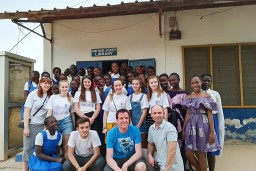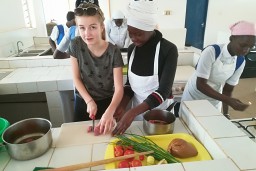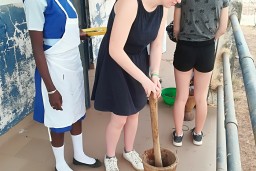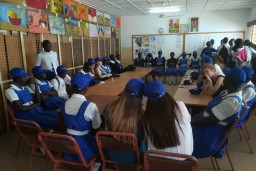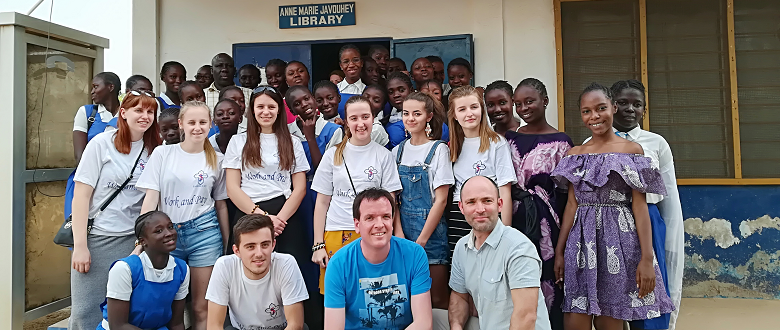
“The Gambian and Belgian education systems are miles apart yet share an important goal: to nurture learners into tomorrow’s outspoken and critical citizens”, says teacher Tom Boeve, one of the pioneers of the schoollink between a school in Oostende, Belgium, and one in The Gambia’s capital Banjul. Their schoollink revolves around health, education and the environment.
2-way street
14 years ago, a partnership was forged between one school in Belgium, Sint-Jozefsinstituut-Petrus & Paulus-Centrum, and another in The Gambia, St. Joseph’s Senior Secondary School. “In the beginning, our collaboration mainly revolved around creating powerful learning environments for the students in Banjul”, says Belgian teacher Tom Boeve, who was part of the schoollink avant la lettre from the get-go. In that first phase, the schools focused on issues of sub-optimal infrastructure and learning materials to improve the quality of education.
It wasn’t until much later that the schoollink evolved into an exchange about cultures and traditions. Past spring, seven students and three teachers from Belgium visited Banjul (see pictures above and below). Thanks to funding support from the city of Oostende, Gambian teachers and students will be visiting Belgium too. “We want the exchange to be a two-way street”, Tom says.
Recently VVOB too started supporting and facilitating the link through its own SchoolLinks programme. “This creates room for us to forge a real pedagogical bond between the two schools,” Tom continues. “Our education systems are miles apart, so we have to be creative in putting our schoollink into practice. But in the end, we share the same goal: to nurture our students into tomorrow’s outspoken and critical citizens. VVOB’s additional support ushered in a new phase for our schoollink. One infused by the Sustainable Development Goals (SDGs) on health, education and environment.”
Interesting international touch
The choice to work on health issues was driven by a confronting visit to the partner school in Banjul. When 15 students had their eyes checked, two were diagnosed with a severe infection. According to Hannah Cocker, the principal of the school in Banjul, these types of infection are easily preventable with enough vitamins, a varied diet and good hygiene.
“But for those two students, it was too late. They were at high risk of blindness. That seriously undermines their chances of developing to their full potential and of participating in society in a meaningful way.”
This prompted the science teachers to grow a fruit tree orchard in Banjul, supported by their colleague-science teachers in Oostende. They also exchange teaching practices, which gives their lessons an interesting international touch.
Wild dreams
The class groups in St. Joseph’s Senior Secondary School are large and diverse. That’s why, in their exchanges on education, the schools mainly discuss ways to implement differentiated teaching methods. It’s a real challenge for the teachers to handle the heterogeneity in their classrooms, which unavoidably leads to some learners dropping out.
“During our visit, we attended some history and cooking classes with differentiation in mind”, Tom recalls. “We warmed our Gambian colleagues up to the idea of learner-centred teaching, which essentially means students from all levels are involved in class. We’d like to present this and many other teaching methods at a professional development day for teachers in Banjul, where we could also exchange with them on the future of education. But that’s still but a wild dream.”
Engaged students
The more advanced students in Belgium developed a board game about ecology using sustainable materials. “We’re going to translate the game and send it to Banjul. The game playfully uncovers how human beings impact the environment. The plan is to play the game in both schools at the same time and share the outcomes.”
“We’re also planning a large beach clean-up day in both our cities and develop a lesson plan around that. And on top of that, we’re going to work together on recycling, an underused practice in both Belgium and The Gambia.”
“In short, we want to self-reflect about how we can limit our impact on the environment in both our contexts. Luckily our enthusiastic students are fully engaged in this. We’re even using the student councils as a forum to discuss ideas and actions.”
Schoollink for SDGs
Just as human activity has an impact on the environment, so does the schoollink on the schools’ DNA. In Belgium, all teachers are involved in the partnership, even though not everyone visits the partner school.
Tom concludes: “These colleagues do develop teaching materials together with their Gambian counterparts that also raises students’ awareness of the SDGs. Before and after people from our school visit Banjul, the schoollink is all everyone talks about. Our students critically start thinking about their own school and life habits which often leads to very interesting conversations. The schoollink is a strong foundation for lessons about the SDGs, sustainable development and the importance of international cooperation and exchange.”





